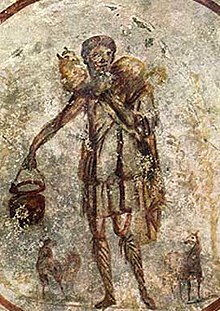|
Throughout the year, the Southern New England Conference of the United Church of Christ reproduces the Daily Lectionary for use by churches. These are the suggested readings for March 26th: Exodus 32:7-14; Psalm 32; and Luke 15:1-10. I would encourage you to read these short selections as part of your Lenten practice.
This makes no sense. And that’s the point. Jesus’ parables draw on shared experiences to make the gospel resonate. The people who are listening to Jesus would know about shepherding. They may not own 100 sheep, but they can ramp-up their own experience and put themselves in the shoes of the shepherd in the story who lost one sheep. When you go looking for clipart to illustrate this parable, they always have an adorable picture of Jesus, the shepherd, finding and rescuing that one lost sheep. It has been a popular Christian art theme for as long as there have been Christians. This is all well and good except for the fact that Jesus’ listeners would have been wondering what happened to the other 99. The shepherd does not leave the 99 in a protective corral or under the care of an associate. Rather, the 99 are left to wander without protection in the wilderness. This would seem to be a recipe for disaster. The unprotected 99 are vulnerable to predators, and just as the one got lost, so could any number of these 99 left on their own in the wilderness. Such possibilities must have jumped out as the people heard Jesus speak. It simply would not be practical to leave the 99 in a precarious situation in order to save the one. When Jesus asks, “‘Which one of you, having a hundred sheep and losing one of them, does not leave the ninety-nine in the wilderness and go after the one that is lost until he finds it?’” it is quite possible that no one would have agreed with this assessment. It simply makes no practical sense. And that’s the point. Religious leaders, we are told, have scoffed at Jesus’ religious credentials because “‘This fellow welcomes sinners and eats with them.’” If Jesus were a true religious teacher, then He would spend His time and exert His efforts among those who are worthy of such things, but Jesus associates with throw-away people. This is the setting for the parable of the one lost sheep. The religious authorities are ridiculing Jesus because sinners have found in Jesus divine compassion and understanding. The sinners are throw-away people to the religious authorities. They are the lost sheep not worth the effort to retrieve. Stick to the practical: worry only about the 99. Jesus is wasting His time. The logic of focusing on the 99 would have made practical sense to everyone in the crowd around Jesus. They may even have gone home later and still mulled over this silliness of the one lost sheep. They would laugh about how preposterous this was. The power of Jesus’ parables is that they got people to thinking. It’s like one of those ear-worm songs that you can’t stop returning to no matter how hard you try. I remember taking my daughters to FAO Schwarz and hearing “Welcome to our world.” I couldn’t get it out of my head. I wondered how in the world the employees at that store could stand it. And the more the people around Jesus thought about this short little parable, maybe they started to think that Jesus knew it made no sense. How could He not? And maybe they got to thinking that the love of God is so much more than practical and logical. Maybe the authorities are satisfied with the idea of throw-away people, but maybe the God of Jesus’ gospel doesn’t accept such logic. Maybe Jesus is revealing a God whose love is above calculations of how good or how bad, and maybe God loves because God is love and God can do nothing less than love. (1 John 4:16) This sort of love makes the cross more logical – not human logic, but divine logic. And this is the God we meet in tomorrow’s Gospel parable, the most amazing parable of all I believe, the parable of the Prodigal Son. In so few words, Jesus reveals so very much. If you would like to join us for worship tomorrow, saint or sinner we don’t care because God doesn’t care, please know we’d love to see you. You can join us in person or if you feel more comfortable you can join us online. Drop an email to [email protected] for the login. If you’d like, here is the link to the Southern New England Conference’s daily reading schedule: www.sneucc.org/lectionary.
0 Comments
Leave a Reply. |
NewsFaith, love and chitchat. Categories
All
Archives
June 2024
Follow
|
|
SERVICE TIMES
Sunday 9:30-10:30am Children Sunday School 9:30-10:30am Nursery care available during worship DONATE Make a single or recurring contribution by clicking here |
FOLLOW
|

 RSS Feed
RSS Feed
